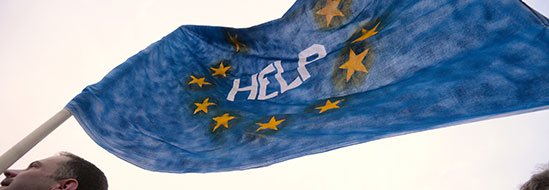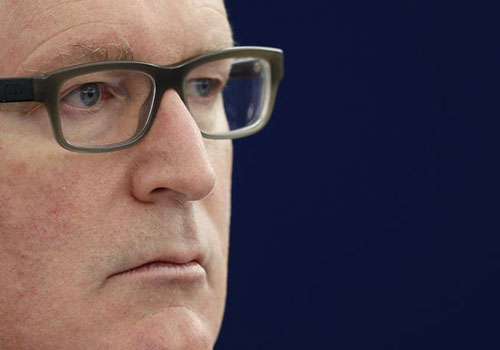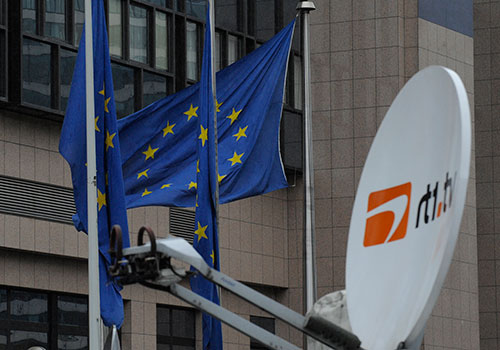EU as media regulator
The 1,000-strong EU press corps does not regularly cover EU press freedom policies, except in exceptional cases when, for instance, the Hungarian prime minister raucously rebuts his adversaries in the European Parliament. “EU correspondents cover the big picture, the big stories which are rocking the EU and its member states, like the Grexit [the scenario of Greece leaving the eurozone], the Brexit [the 2017 U.K. referendum], or the towering role of Germany in the EU,” Georgios Terzis, a Brussels-based media academic who edited Mapping Foreign Correspondence in Europe, told CPJ. “The EU’s press freedom policies, however, are being watched closely by professional organizations, freedom of expression groups, and the media industry.”

The reason for this is “because everything the EU does may have an impact on journalism and media freedom,” Francine Cunningham, executive director of the European Newspaper Publishers’ Association, told CPJ. From the creation of a single market and cross-border trade legislation, to EU laws having to comply with the Charter of Fundamental Rights, professional media organizations and press freedom groups are always on the lookout for EU directives or regulations that could have an impact on their work.
Their circumspection is well advised: While press freedom, among other human rights, should be protected as a fundamental principle under the charter, “compliance is still treated as a political issue that is up for negotiation, rather than a legal requirement,” Israel Butler, of the Open Society European Policy Institute, wrote in 2012. Some apparently innocuous and technical directives can include provisions meant to protect, for instance, corporate secrets—a potential obstacle for journalists.
The commission has the most power in this area. “Only the commission can make legislative proposals which are submitted to the European Parliament and the council,” Le Soir foreign editor and longtime EU correspondent Maroun Labaki told CPJ. “It sets the political tone in Brussels and its influence reverberates in policies and politics throughout the EU, although member states still retain the prerogative to interpret EU directives at the national level.”
“Everything the EU does may have an impact on journalism and media freedom.”
– Françine Cunningham, European Newspaper Publishers Association
The European Audiovisual Media Services Directive was the first significant intervention of the commission in the media sector. Launched in 1989 under the name Television Without Frontiers, and rooted in the EU’s industrial and trade policy, it was meant to set common rules and coordinate EU-wide national legislation in the broadcasting sector. The idea was to protect public service broadcasting, which is a peculiarity of the EU media landscape. Although focused mostly on technical issues, the directive addressed content. Incitement to hatred, for instance, was banned. And it opened a discussion on media pluralism which, drawn from competition rules and the will to address over-dominant providers, “has been interpreted by the EU institutions as a precondition for the existence and the exercise of freedom of expression,” according to an October 2010 background statement on media regulation published by research project Mediadem, an EU-funded project investigating media policies in 14 countries.

A draft revision of the directive is expected in 2016. A number of media organizations and DG Connect officials hope to use it to reinforce provisions on press freedom—in particular, the independence of regulators. In a number of EU countries, governments, political parties, and other interest groups still see the national state broadcasting system as a source of power up for grabs. Spain, for instance, where nominations of management are decided by the parliamentary majority, was criticized by an international press freedom delegation in December 2014 in which CPJ participated. The situation is particularly worrying in southeastern Europe. “Many governments have transformed the state media not into independent broadcasting services run by professionals to serve the public, but into their propaganda machinery,” according to Marius Dragomir and Mark Thompson of the Open Society Foundations program on independent journalism.
“Public broadcasters should be shielded from intrusive political influences through a number of mechanisms and institutions,” Nicola Frank, who heads the European affairs team of the European Broadcasting Union, an association of public broadcasters, told CPJ. “The independence of media regulators should be a core issue of the revision of the directive.” It would be in line with the European Court of Human Rights’ judgment in September 2009, under which states are obligated to ensure independence from political interference and control. A first step was taken with the creation in February 2014 of the European Regulators Group for Audiovisual Media Services, tasked with advising the commission on the implementation of the Audiovisual Media Services Directive in what is known as a converged media environment, where traditionally separate branches of media, such as telephones, television, and the Internet, form a single network.
Although the draft directive looks purely technical or administrative, it has led some critics, particularly newspaper publishers, to say they believe it provides Brussels with a way to influence media governance in member states. “Under the cover of the converging media landscape, the EU could try to apply the new audiovisual directive to newspapers and subject them to similar regulation of the audiovisual sector which was regulated originally because of the scarcity of channels,” publishing association director Cunningham told CPJ. “The EU should not be involved in media regulation,” she added. “Industry self-regulation is the best system.”
Similar suspicions haunt the drafting of other apparently purely technical directives. Battles on intellectual property theft in the digital sphere have been vibrant in Brussels, as Parliament’s rejection in 2012 of the global Anti-Counterfeiting Trade Agreement showed. A coalition of digitally savvy activists, who claimed the agreement would punish citizens for sharing content, upset the plans through lobbying and social media protests, according to reports. The proposed reform of copyright laws submitted by the commission also raised controversies. Newspaper and book publishers, who have been engaged in a showdown with tech giants, joined a Copyright for Freedom coalition which bases its case on the notion that “copyright is an enabler of freedom of expression.” It is mainly related to the tug of war between the legacy print media and the major search engines and news aggregators, particularly Google, and attempts to make these providers pay for copyrighted material displayed on their sites. The battle continues between rights holders, Internet consumers, and Internet service providers. “The European Commission should carefully assess whether existing EU copyright is congruent with free speech concerns, the right to inform, and the right to be informed,” according to a March 2013 policy briefing for Mediadem.
Although it denies trying to overextend the treaties, the commission follows a proactive policy of issuing reports, commissioning studies, and convening experts’ meetings that aim to inspire EU policies and encourage member states. These initiatives contribute to the creation of an EU media sphere and the dissemination of common norms under the guise of coordinating or harmonizing national laws and practices. They increasingly give a European frame and color to issues that were largely supposed to remain “national.”
In 2013, for instance, the EU published guidelines on the promotion and protection of freedom of religion or belief, which recommend the decriminalization of blasphemy. Such laws, the document underlined, “restrict expression concerning religious or other beliefs; they can have a serious inhibiting effect on freedom of expression and on freedom of religion or belief.” The EU has also been trying to find common ground on hate speech. The Audiovisual Media Services Directive prohibits “any incitement to hatred based on race, sex, religion, or nationality.” It states: “EU countries can restrict the retransmission of unsuitable on-demand audiovisual content—e.g., Neo-Nazi propaganda—that may not be banned in its country of origin.”
A Framework Decision on racism and xenophobia was adopted by the Council in November 2008 after seven years of negotiation, due mainly to disparity in member states’ legal systems and traditions on freedom of expression. It listed a number of offenses including publicly inciting violence and hatred and publicly condoning, denying, or grossly trivializing crimes of genocide—in particular, the Holocaust—crimes against humanity, and war crimes. A framework decision is binding on the objective—combating racism—but allows member states to choose the methods to achieve it. However, a 2014 assessment by the commission found that a number of countries had not fully taken on board the provisions, particularly when it came to denying or trivializing genocide, crimes against humanity, or war crimes.
The European Agenda on Security, adopted in April 2015 by the commission, is also committed to monitoring hate speech online. “In the current climate, we need urgently to move away from the culture of impunity we see on Internet and social media platforms,” Morten Kjaerum, then-director of the EU Agency for Fundamental Rights, said in a joint statement with the OSCE and the Council of Europe in March 2015. As a sign of the prominence of the issue on the EU’s agenda, the commission has dedicated its first Annual Colloquium on Fundamental Rights, to be held in Brussels in October 2015, to combating anti-Semitic and anti-Muslim sentiment in Europe. The EU’s approach to hate speech—and more particularly, to Holocaust denial—has regularly been criticized by free speech advocates, but in the wake of debates after the violent reaction to cartoons of the Prophet Muhammad in Denmark and France, it has also been denounced by Islamic governments and clerics as a sign of double standards and used, in a questionable exercise of moral equivalence, to justify calls for banning so-called “denigration of religion.”

Other initiatives confirm the will of the EU and the commission, in particular, to attempt to influence the freedom of expression and media policy agenda. In 2010, the launch of Mediadem was presented as a mainly academic exercise. But its assumptions on the role of media in promoting democracy and its defense of independent public service broadcasting could be seen as a mission statement on how to ensure media independence, pluralism, and freedom. The High-Level Group on Media Freedom and Pluralism, set up in 2011 under former Digital Agenda Commissioner Neelie Kroes, reflected to some extent the ambitions of the commission when it recommended in its January 2013 report that the EU “be considered competent to act to protect media freedom and pluralism at the state level in order to guarantee the substance of the rights granted by the treaties to the EU citizens.”
The commission also plays a proactive role in funding press freedom projects. As well as co-funding the Centre on Media Pluralism and Media Freedom, tasked with improving the protection of media pluralism in Europe, it allocated €800,000 to four projects in 2014: the Safety Net for European Journalists, focused on Italy, southeast Europe, and Turkey; a criminal defamation project; real-time mapping of violations of press freedom and pluralism in EU member states and candidate countries; and the strengthening journalism in Europe project with the Centre for Media Pluralism and Media Freedom and the Center for Media and Communications Studies. In 2015, it announced funding for the European Centre for Press and Media Freedom, based in Leipzig, Germany. The commission sees the center’s purpose as being to unite the press freedom community and tackle violations in the EU and beyond.
“Public broadcasters should be shielded from intrusive political influences.”
– Nicola Frank, European Broadcasting Union
“Up to now, touchy member states have not reacted negatively,” an EU official and one of the initiators of the project, told CPJ. The official, who asked to remain anonymous, added, “Of course such centers have no implementing power but they will subject the EU and its member states to the monitoring system and, therefore at times, to naming and shaming.”
Are these EU-backed projects a subtle way to improperly guide and influence the media sphere? There are regular insinuations, mainly from Euroskeptics, that the EU tries to buy itself the acquiescence of non-governmental organizations and journalists by funding media projects. The commission and grantees, however, reject such claims. Other press freedom advocates who spoke with CPJ fear that some projects are overlapping and creating rivalries between press freedom and professional organizations as well as with Council of Europe projects, such as the newly established Platform to Promote the Protection of Journalism and Safety of Journalists. Some media professionals told CPJ they were wary that the commission might be tempted, under EU values, to favor a specific doctrine of journalism anchored in the concepts of social responsibility and public interest. The high-level group convened by Kroes in 2011 suggested exactly that: In its January 2013 report, it advised that the commission be granted the role of a media super-regulator with power to monitor an EU-wide network of independent media councils and judge whether they were in compliance with EU values. The suggestion was rejected by press freedom and professional groups. “Attempts to define, limit, and take away journalistic status or let political bodies oversee the media will undermine both our media freedom and our democracies,” Kirsty Hughes, then chief executive of Index on Censorship, wrote in European Voice, the EU-focused paper taken over in 2015 by Politico. “The high-level group should go back to the drawing board.”